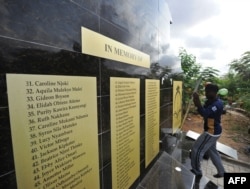Human Rights Watch is accusing Kenyan security forces of making dozens of people disappear in the past two years, during its operation to flush out al-Shabab supporters and sympathizers in northeastern Kenya and Nairobi. The organization is calling on authorities to shut down and investigate the operation, aimed at weeding out suspected terrorists.
A report titled “Death and Disappearances” documents 34 disappearances during the past two years at the hands of different Kenyan security agencies.
Human Rights Watch Executive Director Kenneth Roth says various security services have been involved in the rights violations, including the military.
“What we highlight in this report are 54 cases and in 11 of these cases, bodies have been found," said Roth "So technically these are not disappearances, we know where the body is, but they are part of the same pattern. In 34 cases the victims continued to be disappeared. We do not know where the person is, rather than last having been seen in official custody.”
Somali Kenyans targeted
Human Rights Watch found security operations targeted young ethnic Somali Kenyans, clerics, and Islamic school teachers.
Adan Yusuf says his brother Omar disappeared in April 2015 in Mandera, a town that borders Somalia.
Yusuf says Omar was picked up by two Criminal Investigation officers and has not been seen since.
Yusuf says his brother was at a tea kiosk when two Criminal Investigation officers, who are well known in the area, told him they wanted to ask him some questions. Yusuf says his brother knew the officer and went with them, and that was the last time he was heard from.
Yusuf hopes to see his brother again one day, either dead or alive.
The investigators found that in the initial stage of arrests, some suspects were detained and transported to military makeshift camps and bases in the northeast and other parts of the country.
Roth of HRW says every security department in the country is involved in the ongoing counterterrorism operations.
“This efforted disguise is not longstanding; in other words the initial effort to disguise very quickly breaks down... Sometimes the victim is brought to a police station, although the victim is not registered in the police station, but always they end up either in a military base or sometimes in a less formal military encampment in the forest. In some cases the body is later found,” Roth said.
Al-Shabab attacks
Kenya has experienced a series of terror attacks targeting civilians and security forces, most notably the massacres at Nairobi’s Westgate Mall in 2013 and last year at Garissa University College. Somali militant group al-Shabab claimed responsibility, saying the attacks were retaliation for the presence of Kenyan troops in Somalia.
Human Rights Watch says nothing justifies the disappearances, killings and rights violation witnessed in Kenya.
Police spokesman Charles Owino says police had no involvement in the forceful disappearances.
“If Independent Police Oversight Authority together with witness protection unit and DPP [Director of Public Prosecutions] will point a finger at a policeman, we will charge him accordingly like any other criminal,” said Owino.
This week, four Kenyan police officers were charged with murder in connection with the death of three men whose bodies were found in a river north of Nairobi, a few days after they were reportedly taken to a police compound.
The Independent Police Oversight Authority has the powers to investigate the police, but not other security departments.
Human Rights Watch is calling on the government to form a commission of inquiry to investigate the alleged abuses, including those committed by the military.





